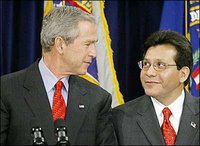 Law-abiding American citizens, so often naively reliant upon magisterial codes in foreign lands that it has become a touristic cliche, have long since become acquainted by the Bush administration to the art of the possible. Att. Gen. Alberto Gonzalez is gung ho for executive powers, particularly in war, when a Congressional nod of confidence to the President can then be applied, carte blanche, to every hill n' stream in his alternate universe--wherein checks-and-balance becomes cheers-and-happenstance, constitutional interpretation an archaic remnant of an fulsome age before globalization terrorists. This is only the obvious, of course, which has been left alone to rot on yellowing newspaper pages and trickle to the sidelines of American self-criticism (if that's still legal in times of "war".) But still, I want to highlight a few words by Gonzalez, drawn from today's NYT. These stood out to me, because I am still trying to gauge how pliable Bush, et. al. believe American laws are:
Law-abiding American citizens, so often naively reliant upon magisterial codes in foreign lands that it has become a touristic cliche, have long since become acquainted by the Bush administration to the art of the possible. Att. Gen. Alberto Gonzalez is gung ho for executive powers, particularly in war, when a Congressional nod of confidence to the President can then be applied, carte blanche, to every hill n' stream in his alternate universe--wherein checks-and-balance becomes cheers-and-happenstance, constitutional interpretation an archaic remnant of an fulsome age before globalization terrorists. This is only the obvious, of course, which has been left alone to rot on yellowing newspaper pages and trickle to the sidelines of American self-criticism (if that's still legal in times of "war".) But still, I want to highlight a few words by Gonzalez, drawn from today's NYT. These stood out to me, because I am still trying to gauge how pliable Bush, et. al. believe American laws are:
Mr. Gonzales conceded that his was not the only possible way to harmonize the two Congressional actions. But the administration's reading is, Mr. Gonzales said, "fairly possible." Given that, he continued, the Constitution requires deference to the executive branch's interpretation under a doctrine known as constitutional avoidance, which counsels against reading statutes in a way that creates constitutional conflict when another reasonable interpretation is availableIn context, these words speak to the wire-tapping escapade; but out of context, it is a reflection of the administration's self-aggrandizing presumption of singular authority unrestrained by normal legal restraints or historic limitations. Imagine, for yourself, how an administration with such a view might apply a retroactive anti-torture doctrine paired with a executive footnote.




0 Comments:
Post a Comment